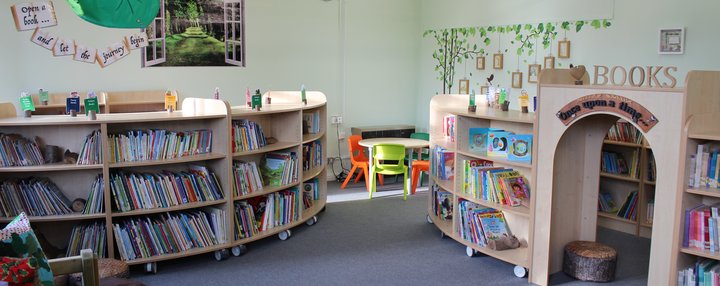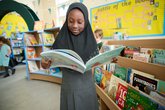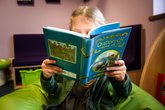School libraries face a chronic lack of investment, with the most disadvantaged communities most affected: 1 in 7 primary schools in England do not have a library and this rises to 1 in 4 in disadvantaged areas. This means that over three-quarters of a million children in the UK do not have access to books that we know enable better educational outcomes and greater well-being. There is no statutory requirement for schools to have a library.
Libraries for Primaries campaign
Founded in November 2021 by the National Literacy Trust and Penguin Random House UK, the Libraries for Primaries campaign (formerly the Primary School Library Alliance) is a group of organisations who work to address the lack of investment in primary school libraries.
We have now transformed 1,000 school libraries and trained over 2,000 teachers and support staff. The next phase is to ensure that every primary school in the UK has a library or dedicated library space.
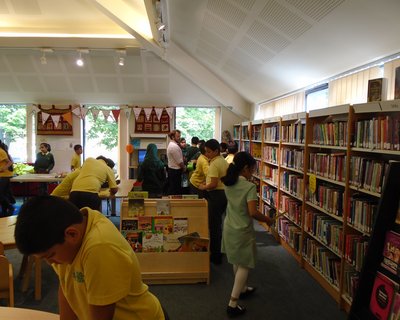
One thousand libraries
Read Waterstones Children’s Laureate Joseph Coelho's original and exclusive poem written for us to commemorate our exciting Libraries for Primaries campaign milestone.
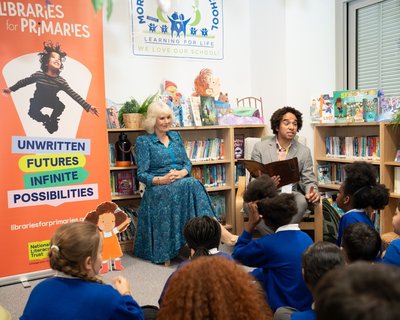
Programmes
Our evidence-based school library programmes provide the tools to help schools transform their reading spaces, and create connected communities of readers. Since the Primary School Library Alliance was convened in 2021 our programmes have been supported by a wide range of funders.
If you are interested in your school taking part in one of our libraries programmes, please email us.
-
Run in partnership with Chase Bank, and Puffin, supporting primary schools to reinvigorate school libraries and reading spaces and champion reading for pleasure across the school...Learn more about Chase Rewarding Futures School Libraries Programme.
-
Developed in partnership with Penguin Random House, supporting primary schools to reinvigorate school libraries and reading spaces and champion reading for pleasure.Learn more about World of Stories.
-
The Portal School Libraries programme will support nine primary schools across Lambeth to develop their book corners and library spaces.Learn more about Portal School Libraries Programme.
-
The Bloomberg Coronation Libraries programme will support 25 primary schools across Islington and Croydon to develop their school book corners and library spaces in honour of the...Learn more about Bloomberg Coronation Libraries.
Resources and training
Here you can find resources to help you audit and develop your reading for pleasure provision. For schools with National Literacy Trust membership we offer free online training that will help you improve your knowledge of children’s books, create an effective reading environment, and engage the whole school community in reading for pleasure.
If your school isn't a subscribed member, find out more about National Literacy Trust membership.
-
The impact of Puffin World of Stories and our top five starting points for improving your school libraryLearn more
-
This resource showcases successful school library projects and strategies our members used to support teaching reading to EAL learners and engaging parents in literacyLearn more
-
Join our webinar series to develop your knowledge to ensure your library collection and reading experience is as diverse and inclusive as possible.Learn more
-
Discover a range of topics to support, inspire and equip librarians, teachers and support staff in their bid to create welcoming and well-resourced libraries in their setting.Learn more
School libraries research
Our research shows that school libraries have a positive impact on all areas of pupils’ literacy and learning, and have never been needed more
-
Evidence from across the sector and submissions from teachers to give an idea of the current situation in primary school libraries; the benefits they bring to pupils and...Learn more
-
We explored children and young people’s use of school libraries and conducted a review of international research that has examined the potential impact of school library use.Learn more
-
This paper from the National Literacy Trust and Nottingham Trent University explores how children on free school meals use their school library and how this links to their...Learn more
Success Stories
-
School Librarian Leia Sands describes how the Foyle Primary Library Course has inspired her to fully engage with the whole school community to encourage reading.Learn more about Love our Libraries helps to engage the whole school at Steyning Church of England Primary School.
-
Kelvin Brown, Governor at Wychall Primary School in Birmingham, found new and inspiring ways to help pupils engage in reading through our Foyle Primary School Library Course.Learn more about Encouraging pupils to engage with reading at Wychall Primary.
-
Volunteer librarian Clare Zinkin explains how she used the new Foyle Primary School Library Course to transform Etz Chaim Jewish Primary School's library.Learn more about Inspiring new ideas for Etz Chaim’s school library.
